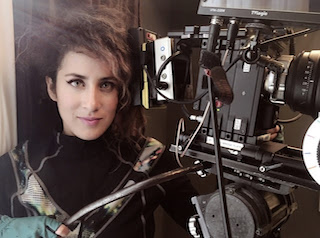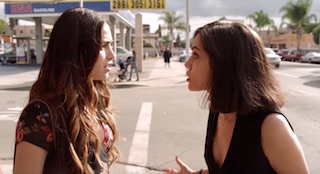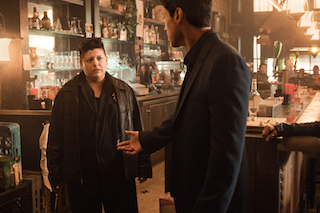 Post-production finishing for the first season of Vida, the new half-hour drama from Starz and executive producer Tanya Saracho, was recently completed at MTI Film. Senior colorist Steve Porter worked with series cinematographer Carmen Cabana in finalizing the look of the show, which has just been renewed for a second season and has drawn rave reviews for its revealing portrait of Latinx life in East Los Angeles.
Post-production finishing for the first season of Vida, the new half-hour drama from Starz and executive producer Tanya Saracho, was recently completed at MTI Film. Senior colorist Steve Porter worked with series cinematographer Carmen Cabana in finalizing the look of the show, which has just been renewed for a second season and has drawn rave reviews for its revealing portrait of Latinx life in East Los Angeles.
Vida centers on a pair of grown-up sisters who return to their East Los Angeles home following the death of their mother and face the prospect of running her struggling bar along with her “roommate”. The young women must learn to work together, come to grips with the secrets of their mother’s past and navigate the changing cultural landscape of the neighborhood where they grew up.
Cabana, whose previous work includes the Netflix series Narcos, does a masterful job in capturing the sun-washed tones of the barrio and the disparate personalities and ethnicities of its residents. She explains that her aim was not to present a homogenized view of urban life, but rather convey how it is experienced by the people who live there. “The show was never intended to have a glossy or stylized aesthetic, but that doesn’t mean it couldn’t be cinematic,” she said. “Many producers interpret a ‘realistic’ look as unshaped lighting and frantic handheld. I think of real life as having defined shadows and layers of light and color.”
Cabana shot with an Arri Alexa Mini and Cooke S5 lenses for both interiors and exteriors. That combination allowed her to work quickly and achieve shallow depth of field. “It was quite challenging for our focus pullers because, as an operator, I don’t stay still,” she said. “I move with the actors’ movements and with the emotion of the scene as I feel it when I see through the lens.”
 Reflecting the show’s unusual subject matter and point of view, Cabana developed a unique visual style to draw viewers into the world inhabited by its central characters. “The show has strong women as the leads and a good amount of sex scenes, which we approached from a female perspective,” she said. “We’re used to seeing sex scenes in which women are objectified, but on Vida, we see women in pursuit their own pleasure as they see fit. There is a sense of liberation that we sought to capture with a very fluid camera approach. When it came to sex scenes we encouraged the camera and the actors to move freely and explore. It was messy and smooth, violent and sweet…like sex can be.”
Reflecting the show’s unusual subject matter and point of view, Cabana developed a unique visual style to draw viewers into the world inhabited by its central characters. “The show has strong women as the leads and a good amount of sex scenes, which we approached from a female perspective,” she said. “We’re used to seeing sex scenes in which women are objectified, but on Vida, we see women in pursuit their own pleasure as they see fit. There is a sense of liberation that we sought to capture with a very fluid camera approach. When it came to sex scenes we encouraged the camera and the actors to move freely and explore. It was messy and smooth, violent and sweet…like sex can be.”
Cabana’s precise visual aesthetic was further refined through grading sessions at MTI Film. After working with MTI Film’s Johnnie Kirkwood on the series pilot, Cabana, who is a colorist herself, collaborated with Steve Porter on the six episodes that comprise the first season. She says they made an instant connection, noting, “Steve is the perfect complement to my cinematography. Even before we met, he did a pass on the footage and understood completely what I was going for. He not only respected my shadows, contrast and style, but improved it. LA is not known for its beautiful skies, between the smog and lack of clouds, there ain’t much there, but Steve dug in and found clouds and boosted the blue. He has a gifted eye and an amazing personality.”
 Porter recalls that Cabana had clear ideas about both the overall look of the show and details within it. He says that she was particularly insistent about retaining the variations in the features of the show’s multicultural cast. “She didn’t want everyone to look one specific way,” he explained. If someone had a little more olive in their skin, we kept that. A lot of shows would blend that out. We adhered to the culture of Vida."
Porter recalls that Cabana had clear ideas about both the overall look of the show and details within it. He says that she was particularly insistent about retaining the variations in the features of the show’s multicultural cast. “She didn’t want everyone to look one specific way,” he explained. If someone had a little more olive in their skin, we kept that. A lot of shows would blend that out. We adhered to the culture of Vida."
Porter adds that it was inspiring to work with a cinematic artist who brings passion and a distinct point of view to her work. “She not only worked behind the camera, she did the handheld, the lighting, the framing…everything,” he said. “She kept things very real and helped tell the story.”
Noting that it was her first experience in working at MTI Film, Cabana says that she was impressed that the company’s staff was not only able to help her achieve her creative goals, but to do so within the confines of her hectic schedule. “They were very accommodating,” she recalled. “I was unable to be physically present to supervise the coloring on episode 3 because I was in Europe, but they kept me involved remotely. Upon my return, I had only a few weeks in LA and the MTI team went the extra mile to make it possible for me to have a pass at the final episodes. They cared as much about Vida as I did.”
MTI Film http://www.mtifilm.com
